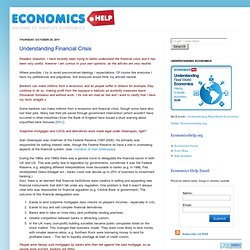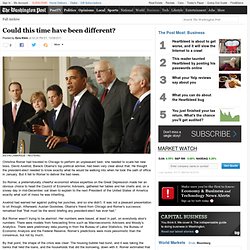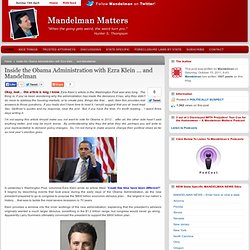

Economics Essays: Understanding Financial Crisis. Readers Question.

I have recently been trying to better understand the financial crisis and it has been very useful, however I am curious to your own opinions, as the articles are very neutral. Where possible, I try to avoid preconceived ideology / expectations. Of course like everyone I have my preferences and prejudices. Not everyone would think my articles neutral. Bankers can make millions from a recession, and as people suffer in Greece for example, they continue to do so, making profit from the taxpayer´s bailouts as austerity measures leave thousands homeless and without work. Some bankers can make millions from a recession and financial crisis, though some have also lost their jobs. Subprime mortgages and CDOs and derivatives were made legal under Greenspan, right? Alan Greenspan was chairman of the Federal Reserve (1987-2006). During the 1980s and 1990s there was a general move to deregulate the financial sector in both UK and US.
Understanding the economic crisis from a variety of points of view: University of Chicago faculty provide their perspectives. Index.cfm?FuseAction=Files. Insight into macroeconomics and the financial markets from the Financial Times. On macroeconomics Welcome.

If you have yet to register on FT.com you will be asked to do so before you begin to read FT blogs. However, our posts remain free. A blog on macroeconomics, economic policymaking and the financial markets. Gavyn usually writes about a key topic of the week on Sunday. Follow Gavyn Davies on the A-List. Gavyn Davies is a macroeconomist who is now chairman of Fulcrum Asset Management and co-founder of Prisma Capital Partners. He has also served as an economic policy adviser in No 10 Downing Street, an external adviser to the British Treasury, and as a visiting professor at the London School of Economics. Gavyn Davies is an active investor and may have financial interests and holdings in any of the topics about which he writes. Could this time have been different? (KEVIN LAMARQUE - REUTERS) Christina Romer had traveled to Chicago to perform an unpleasant task: she needed to scare her new boss.

David Axelrod, Barack Obama’s top political adviser, had been very clear about that. He thought the president-elect needed to know exactly what he would be walking into when he took the oath of office in January. But it fell to Romer to deliver the bad news. So Romer, a preternaturally cheerful economist whose expertise on the Great Depression made her an obvious choice to head the Council of Economic Advisers, gathered her tables and her charts and, on a snowy day in mid-December, sat down to explain to the next President of the United States of America exactly what sort of mess he was inheriting.
Axelrod had warned her against pulling her punches, and so she didn’t. But Romer wasn’t trying to be alarmist. The next challenge was to persuade Congress. There was only one problem: It was wrong. The issue is the graph on Page 1. This time is different. Inside the Obama Administration with Ezra Klein … and Mandelman. Okay, look… this article is long, I know.

Ezra Klein’s article in the Washington Post was also long. The thing is, if you’ve been wondering why the administration has made the decisions it has, why they didn’t do more to address the housing markets, or to create jobs, things like that… well, then this provides real answers to those questions. If you really don’t have time to read it, I would suggest that you at least read Sec. Geithner’s quotes and my response, near the end. But, if you have the time, it’s worth reading… I spent three days writing it. I’m not saying this article should make you not want to vote for Obama in 2012… after all, the other side hasn’t said anything better, and may be much worse.
In yesterday’s Washington Post, columnist Ezra Klein wrote an article titled: “Could this time have been different?” A couple of paragraphs later, of Romer’s forecast, Klein states: “There was only one problem: It was wrong.” Problems Forecasting Unemployment… Really? Excuse me?